新视野大学英语第二册第二单元课文详解
新视野大学英语读写教程2(第三版)unit2课文原文及翻译

新视野大学英语读写教程2(第三版)unit2课文原文及翻译ost importantly,studying the humanities invests us P3 播放器那样的有用产品。
然而,仅有很少的人具有能力创造出一个如 iPod 那样的精彩品牌。
最重要的是,学习人文学科使我们具有伟大的洞察力和自我意识,从而以积极和建设性的方式来发挥我们的创造力和才艺。
Perhaps the best argument in favor of the humanities is the scope of possibilities that areatt Damon. Dr. HaroldVarmus, edicine, studied the humanities. Even Michael Eisner,Chairman of the Disney Company, majored in the humanities. Famous people anities make a long list indeed. It”s easy to see that the humanities can prepare us formany different careers and jobs edicine, business, science orentertainment.也许,支持人文学科的最好论点是,人文学科为我们提供了广阔的机会。
你知道世界闻名的电影《泰坦尼克号》的导演詹姆斯·卡梅隆拿的是人文学科的学位吗?第一个登上太空的女宇航员萨利·赖德拿的也是人文学科的学位。
还有电影演员李小龙、格温妮丝·帕特洛·蕾妮·齐薇格及马特·达蒙,也都如此。
获诺贝尔医学奖的哈罗德·瓦慕斯博士也学过人文学科。
甚至迪士尼公司的总裁迈克尔·艾斯纳也主修人文学科。
新视野大学英语读写教程2--unit-2-课文原文及翻译
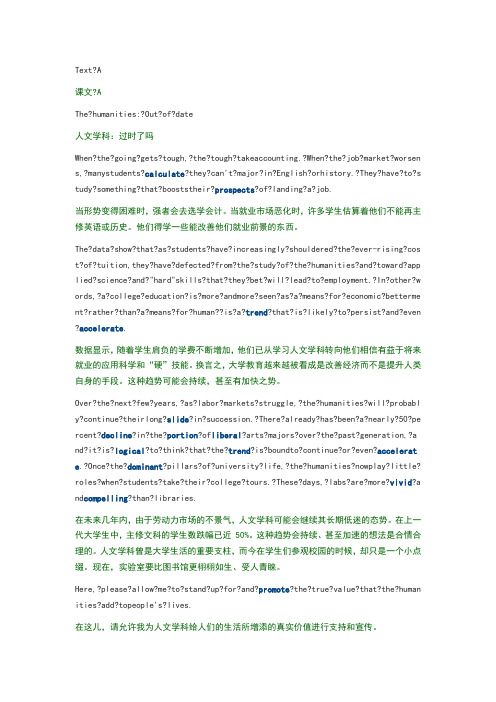
Text?A课文?AThe?humanities:?Out?of?date人文学科:过时了吗When?the?going?gets?tough,?the?tough?takeaccounting.?When?the?job?market?worsen s,?manystudents?calculate?they?can't?major?in?English?orhistory.?They?have?to?s tudy?something?that?booststheir?prospects?of?landing?a?job.当形势变得困难时,强者会去选学会计。
当就业市场恶化时,许多学生估算着他们不能再主修英语或历史。
他们得学一些能改善他们就业前景的东西。
The?data?show?that?as?students?have?increasingly?shouldered?the?ever-rising?cos t?of?tuition,they?have?defected?from?the?study?of?the?humanities?and?toward?app lied?science?and?"hard"skills?that?they?bet?will?lead?to?employment.?In?other?w ords,?a?college?education?is?more?andmore?seen?as?a?means?for?economic?betterme nt?rather?than?a?means?for?human??is?a?trend?that?is?likely?to?persist?and?even accelerate.数据显示,随着学生肩负的学费不断增加,他们已从学习人文学科转向他们相信有益于将来就业的应用科学和“硬”技能。
换言之,大学教育越来越被看成是改善经济而不是提升人类自身的手段。
新视野大学英语第二版第二册课文翻译unit2-sectionb
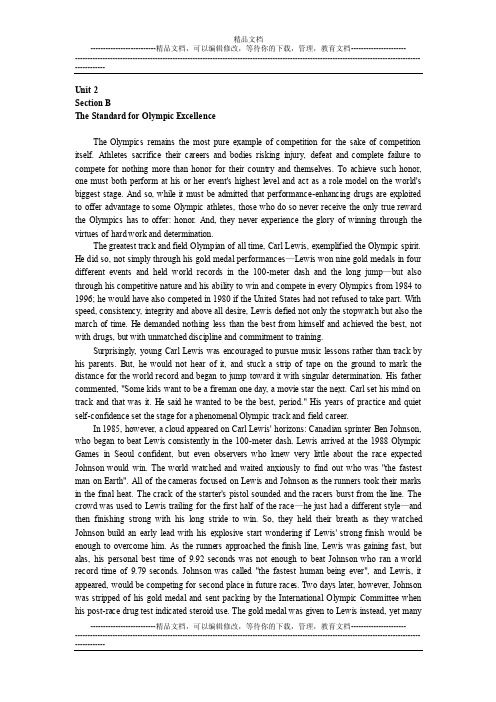
Unit 2Section BThe Standard for Olympic ExcellenceThe Olympics remains the most pure example of competition for the sake of competition itself. Athletes sacrifice their careers and bodies risking injury, defeat and complete failure to compete for nothing more than honor for their country and themselves. To achieve such honor, one must both perform at his or her event's highest level and act as a role model on the world's biggest stage. And so, while it must be admitted that performance-enhancing drugs are exploited to offer advantage to some Olympic athletes, those who do so never receive the only true reward the Olympics has to offer: honor. And, they never experience the glory of winning through the virtues of hard work and determination.The greatest track and field Olympian of all time, Carl Lewis, exemplified the Olympic spirit. He did so, not simply through his gold medal performances—Lewis won nine gold medals in four different events and held world records in the 100-meter dash and the long jump—but also through his competitive nature and his ability to win and compete in every Olympics from 1984 to 1996; he would have also competed in 1980 if the United States had not refused to take part. With speed, consistency, integrity and above all desire, Lewis defied not only the stopwatch but also the march of time. He demanded nothing less than the best from himself and achieved the best, not with drugs, but with unmatched discipline and commitment to training.Surprisingly, young Carl Lewis was encouraged to pursue music lessons rather than track by his parents. But, he would not hear of it, and stuck a strip of tape on the ground to mark the distance for the world record and began to jump toward it with singular determination. His father commented, "Some kids want to be a fireman one day, a movie star the next. Carl set his mind on track and that was it. He said he wanted to be the best, period." His years of practice and quiet self-confidence set the stage for a phenomenal Olympic track and field career.In 1985, however, a cloud appeared on Carl Lewis' horizons: Canadian sprinter Ben Johnson, who began to beat Lewis consistently in the 100-meter dash. Lewis arrived at the 1988 Olympic Games in Seoul confident, but even observers who knew very little about the race expected Johnson would win. The world watched and waited anxiously to find out who was "the fastest man on Earth". All of the cameras focused on Lewis and Johnson as the runners took their marks in the final heat. The crack of the starter's pistol sounded and the racers burst from the line. The crowd was used to Lewis trailing for the first half of the race—he just had a different style—and then finishing strong with his long stride to win. So, they held their breath as they watched Johnson build an early lead with his explosive start wondering if Lewis' strong finish would be enough to overcome him. As the runners approached the finish line, Lewis was gaining fast, but alas, his personal best time of 9.92 seconds was not enough to beat Johnson who ran a world record time of 9.79 seconds. Johnson was called "the fastest human being ever", and Lewis, it appeared, would be competing for second place in future races. Two days later, however, Johnson was stripped of his gold medal and sent packing by the International Olympic Committee when his post-race drug test indicated steroid use. The gold medal was given to Lewis instead, yet many --------------------------精品文档,可以编辑修改,等待你的下载,管理,教育文档----------------------------------------------------------------------------------------------------------------------------------------------------------------did not see his conquest as a real victory, and he became swept up in the apparent blanket condemnation of the sport. Worse, a former opponent charged Lewis with steroid use. Lewis firmly denied the charges and countered by proving before a judge that the magazine that had published the stories did so without foundation to their claims. He also participated in drug test after drug test to prove he was clean. An opponent of steroid use, Lewis was never linked to drug use by anything but rumor.It would take the formula of Lewis' further commitment to the sport and his love for competition to lift some of the suspicion from track events and stop the erosion of support that the Olympics began to suffer after Seoul. With his continued hard work and honest participation in sprinting and the long jump, he proved to the world that the Olympic spirit was not dead. And in 1992, Lewis competed in his third Olympics winning two more gold medals in the long jump and 4×100 meter relay with a reception from the public that was fit for a king.The amazing Carl Lewis had demonstrated that he was unlike any athlete who had ever lived, not by simply winning, but by winning honestly, loving to compete and working the hardest for the longest time. His love for the games truly set a new standard for Olympic excellence. (Words: 835)--------------------------精品文档,可以编辑修改,等待你的下载,管理,教育文档----------------------------------------------------------------------------------------------------------------------------------------------------------------。
新视野大学英语第二版第二册课文翻译Unit2-SectionA

Unit 2Sectio n ALearni ng the Olympic Standa rd for LoveNikola i Petrov i ch Anikin was not half as intimi datin g as I had imagin ed he wouldbe. No, this surely was not the ex-Soviet coachmy father had shippe d me out to meet.But Nikola i he was, Petrovi ch and all. He invite d me inside and sat down on the couch, patting the blanke t next to him to get me to sit next to him. I was so nervou s in his presen ce."Y ou are young,"he begani n his Russia n-styleEnglis h. "If you like to try for Olympi c Games, I guessyou will be able to do this. Nagano Olympi c s too soon for you, but for 2002 in Salt Lake City, you couldbe ready.""Y es, why not?" he replie d to the shocke d look on my face. I was a promisi ng amateu r ski er, but by no meansthe top skieri n the country. "Of course, there will be many hard traini ng sessions, and you will cry, but you will improv e."To be sure, there were countl ess traini ng sessio ns full of pain and more than a few tears, but in the five yearsthat followed I couldal ways count on beingencouragedby Nikola i's amusin g storie s and senseof humor."My friend s, they go in the movies, they go in the dance, they go out with girls," he woul dstart. "But I," he wouldcontin ue, loweri ng his voice, "I am practi c e, practi c e, practi c e in the stadium. And by the next year, I had cut 1-1/2 minute s off my time in the 15-kilome ter race!"My friend s askedme, 'Nikola i, how did you do it?' And I replie d, 'Y ou go in the movi es, you go in the dance, you go out with girls, but I am practi c e, practi c e, practi ce.'"Here the storyusuall y ended, but on one occasi on, which we laterl earne d was his 25th weddin g annive rsary, he stoodproudl y in a worn woolen sweate r and smiled and whispe red, "And I tell you, I am 26 yearsold before I ever kiss a girl! She was the womanI later marry."Romanti c and otherwi s e, Nikola i knew love. His consis tent good humor, quiet g ratit ude, percep tivit y, and sinceri ty set an Olympi c standa rd for love that I contin ue to reachfor, even though my skiing days are over.Still, he never babied me. One Februa ry day I had a massiv e headache and felt quitefatigued. I came upon him in a cleari ng, and after approxi mate l y 15 minute s of stridi ng into the cold breeze over the whitepowder to catchhim, I fussed, "Oh, Nikola i, I feel like I am goingto die.""When you are a hundre d yearsold, everyb ody dies," he said, indifferent to my pain. "But now," he contin ued firmly. "Now must be ski, ski, ski."And, on skis, I did what he said. On other matter s, though, I was rebell ious. Once, he packed 10 of us into a Finnis h bachel or's tiny home for a low-budget ski camp. We awokethe first morning to find Nikola i making breakfast and then made quick work with our spoons whilesittin g on makeshi ft chairs around a tiny card table. When we were finish ed, Nikola i stacke d the sti cky bowlsi n front of my sole female teamma te and me, asserti ng, "Now, girlsdo dishes!"I threwmy napkin on the floorand sworeat him, "Ask the damn boys! This is unfair." He neveraskedthi s of me again, nor did he take much notice of my outburst. He savedhis passio n for skiing.When coachi ng, he wouldsing out his instru ction s keepin g rhythm with our stride: "Y es, yes,one-two-three, one-two-three."A dear lady friend of my grandfather, after viewin g a copy of a videoof me traini ng with Nikola i, asked, "Does he also teachdance?"In traini ng, I worked wi thou t rest to correct mistak es that Nikola i pointe d out and I askedaftereach pass if it was better."Y es, it's OK. But the faster knee down, the better.""But is it fast enough?" I'd persis t.Finall y he wouldfrownand say, "Billio n timesyou make motion—then be perfect," reminding me in an I've-told-you-a-billio n-timestone, "Y ou must be patien t."Nikola i's patien ce and my hard work earned me a fourth-placenation al rankin g headin g into the pre-Olympi c season, but then I missed the cut for the 2002 Olympi c s.Last summer, I return ed to visit Nikola i. He made me tea... and did the dishes! We tal ked whilesi ttin g on his couch. Missin g the Olympi c Team the previo us year had made me pauseand reflect on what I had gained—not the least o f which was a quiet, indissolubl e bond with a shortman in a tropical shirt.Nikola i taught me to have the courag e, heart, and discip l ineto persis t, even if it takes a billion tries. He taught me to be thankful in advance for a century of life on earth, and to remind myself everyday that despit e the challe ngesat hand, "Now must be love, love, love."(Words:822)。
新视野大学英语(第二版)泛读教程2_Unit2_课文翻译

Unit 2PASSAGE AIs Education Still an Important Part of Youth Athletics? Education is an important part of youth athletics in the US. Young kids, cooped up in class, long for the relative freedom of the football field, the basketball court, the baseball diamond. They long to kick and throw things, and the fields of organized play offer a place in which to act out these impulses. Kids are basically encouraged, after all, to beat each other up on the football field. Yet for all the chaos, adult guidance and supervision are never far off, and time spent on the athletic fields is meant to be productive. Coaches seek to give lessons in teamwork, self-sacrifice, competition, winning, and losing. Teachers at least want their pupils worn out so that they’ll sit still in reading class.教育是美国青少年体育的一个重要部分。
被局限于教室内的孩子们,是很向往自由空间的,像足球场,篮球场,和棒球场。
新视野大学英语第三版读写教程第二册Unit2课文及翻译
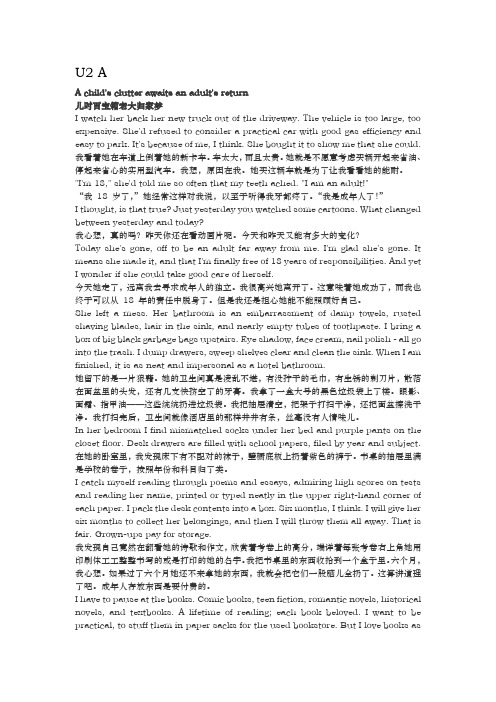
U2 AA child's clutter awaits an adult's return儿时百宝箱老大归家梦I watch her back her new truck out of the driveway. The vehicle is too large, too expensive. She'd refused to consider a practical car with good gas efficiency and easy to park. It's because of me, I think. She bought it to show me that she could. 我看着她在车道上倒着她的新卡车。
车太大,而且太贵。
她就是不愿意考虑买辆开起来省油、停起来省心的实用型汽车。
我想,原因在我。
她买这辆车就是为了让我看看她的能耐。
"I'm 18," she'd told me so often that my teeth ached. "I am an adult!"“我18 岁了,”她经常这样对我说,以至于听得我牙都疼了。
“我是成年人了!”I thought, is that true? Just yesterday you watched some cartoons. What changed between yesterday and today?我心想,真的吗?昨天你还在看动画片呢。
今天和昨天又能有多大的变化?Today she's gone, off to be an adult far away from me. I'm glad she's gone. It means she made it, and that I'm finally free of 18 years of responsibilities. And yet I wonder if she could take good care of herself.今天她走了,远离我去寻求成年人的独立。
新视野大学英语读写综合教程第二册Unit2
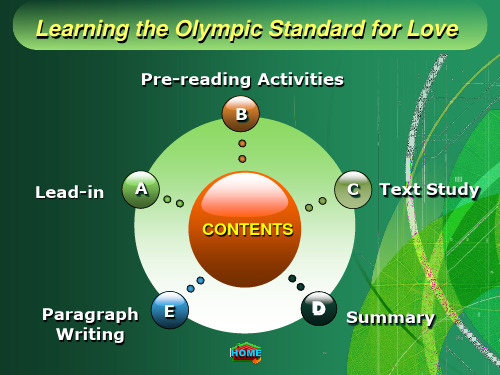
Listen & Discuss
导入
课文
小结
写作
Back
Directions: Listen to the speech from the Opening of
Atlanta Olympic Games by Williams Porter Billy Payne and then discuss the topics as follows (enclosed are the tape script ). Tape script
偶然发现comeupon事先事先预先尼克莱彼德罗维奇安尼金预先inadvanceinadvancenikolaipetrovichanikinnaganosaltlakecity仔细考虑reflecton指出pointout大声地喊出或唱出singouttakenoticeof长野日本城市名盐湖城美国犹他州首府课文分析课文阅读随笔learningtheolympicstandardforlovelearningtheolympicstandardforlovepara1nikolaipetrovichanikinwasnothalfaspara
随 笔 背景知识
导入
课文
小结
写作
Back
For Details
音頻讨论
Compound Dictation
导入
课文
小结
写作
Back
The Olympic Games are the greatest [S01] ______ festival of sport in the world. Every four years, a hundred or more countries send their best [S02] _________ to compete for the highest sportsmen [S03] ______ in sport. As many as 6,000 people honors take part in over 20 sports. For the winners, there are gold medals and [S04] _____. But glory there is honor, too, for all who [S05] ________, compete win or lose, that is, in the spirit of Olympics, to take part is what [S06] matters _______.
新视野大学英语(第二版)Unit2:Charlie Chaplin(导入+结构+阅读课文问题)解析

1972-----retuned back to America and awarded
Special Oscar
1975-----awarded as Title of Knight by Britain
Government
1977-----died at home of Switzerland during the
They include The Pickwick Papers, Oliver Twist, A Christmas Carol, David Copperfield, Great Expectations and A Tale of Two Cities.
structure
Part I : (Para. 1-2) A General Introduction to Charlie Chaplin Part II: (Para. 3-6) C.C.’s artistic achievement
Book 4 Unit 2
Charlie Chaplin
Background Information Watch and Discuss Structure Analysis Detailed Study of the Text Exercises
prop.(stage property)
•A. Dickens •B. Hemmingway
Para.2
Where did Charlie Chaplin receive more applause and profit?
(para.3): C.C.’s huge success with his Tramp (para.4): C.C’s success with sound movies (para.5-6): C.C.’s secret of great comedy
新视野大学英语第三版第二册U2课文原文+翻译
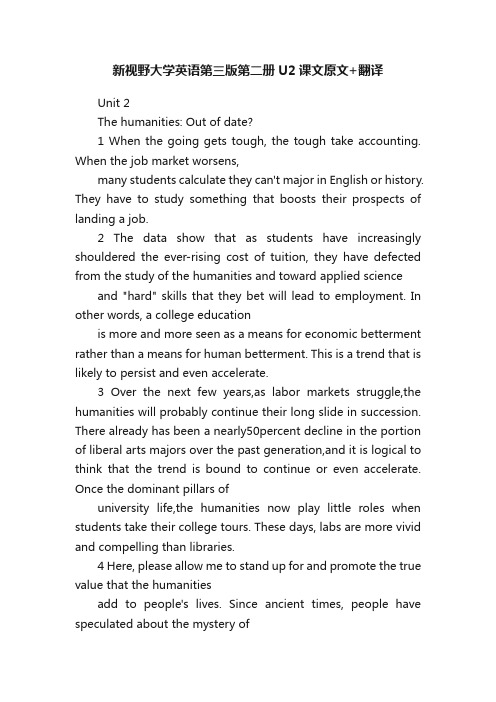
新视野大学英语第三版第二册U2课文原文+翻译Unit 2The humanities: Out of date?1 When the going gets tough, the tough take accounting. When the job market worsens,many students calculate they can't major in English or history. They have to study something that boosts their prospects of landing a job.2 The data show that as students have increasingly shouldered the ever-rising cost of tuition, they have defected from the study of the humanities and toward applied science and "hard" skills that they bet will lead to employment. In other words, a college educationis more and more seen as a means for economic betterment rather than a means for human betterment. This is a trend that is likely to persist and even accelerate.3 Over the next few years,as labor markets struggle,the humanities will probably continue their long slide in succession. There already has been a nearly50percent decline in the portion of liberal arts majors over the past generation,and it is logical to think that the trend is bound to continue or even accelerate. Once the dominant pillars ofuniversity life,the humanities now play little roles when students take their college tours. These days, labs are more vivid and compelling than libraries.4 Here, please allow me to stand up for and promote the true value that the humanitiesadd to people's lives. Since ancient times, people have speculated about the mystery ofthose inner forces that drive some people to greatness and others to self-destruction. Thisinner drive has been called many things over the centuries. The famous psychologist, Sigmund Freud,called it the"unconscious mind"or,more familiarly, "instinct".5 From the beginning of time,this inner aspect of our being,this drive that can be constructive or destructive,has captured our imagination. The stories of this amazing struggle have formed the basis of cultures the world over. Historians, architects, authors, philosophers and artists have captured the words,images and meanings of this inner struggle in the form of story, music, myth, painting, architecture, sculpture, landscape and traditions. These men and women developed artistic "languages" that help us understandthese aspirations and also educate generations. This fertile body of w ork from ancient times, the very foundation of civilization, forms the basis of study of the humanities.6 Studying the humanities improves our ability to read and write. No matter what we do inlife, we will have a huge advantage if we can read complex ideas and understand theirmeaning. We will have a bright career if we are the person in the office who can write aclear and elegant analysis of those ideas!7 Studying the humanities makes us familiar with the language of emotion and the creative process. In an information economy, many people have the ability to produce a useful product such as a new MP3 player. Yet, very few people have the ability to create a spectacular brand:the iPod. Most importantly,studying the humanities invests us with greatinsight and self-awareness, there by releasing our creative energy and talent in a positive and constructive manner.8 Perhaps the best argument in favor of the humanities is the scope of possibilities thatare widely open to us. Did you know that James Cameron, world-famous director of themovie, Titanic ,graduated with a degree in the humanities? So did Sally Ride,the first woman in space. So did actors Bruce Lee, Gwyneth Paltrow, Renee Zellweger and MattDamon. Dr. Harold Varmus,who won a Nobel Prize for Medicine,studied the humanities. Even Michael Eisner,Chairman of the Disney Company, majored in the humanities. Famous people who studied the humanities make a long list indeed. It's easyto see that the humanities can prepare us for many different careers and jobs we can undertake,whether medicine,business,science or entertainment. If we study only mathematics,it's likely we will be a candidate only for jobs as a mathematician. If we include studying the humanities, we can make breakthroughs on many barriers and are limited only by our effort and imagination.9 Of course,nowadays,if we study the humanities alone,we are liable to miss many opportunities. Each one of us needs to become as technically and professionally skilledas possible to help meet the needs of modern life. In fact,increasingly a pairing of technical knowledge and inner insight is seen as the ideal in the establishment of a career. If I were the Dean of Admissions at a medical school and two people applied to our school, both having the required basic scientific courses, one a philosophy major and theother solely a pre-med student, the philosophy applicant would be chosen.10 In summary, the humanities help to create well-rounded human beings with insight and understanding of the passions,hopes and dreams common to all humanity. The humanities, the ancient timeless reservoir of knowledge, teach us to see things differentlyand broaden our horizons. They are as useful and relevant in our modern age as they have always been. Doesn't it make sense to spend some time in the company of the humanities,our outstanding and remarkable treasure of knowledge? Who knows how famous YOU might become!Translation人文学科:过时了吗?1 当形势变得困难时,强者会去选学会计。
新视野大学英语读写教程(第二版)第二册课文及翻译 2解析
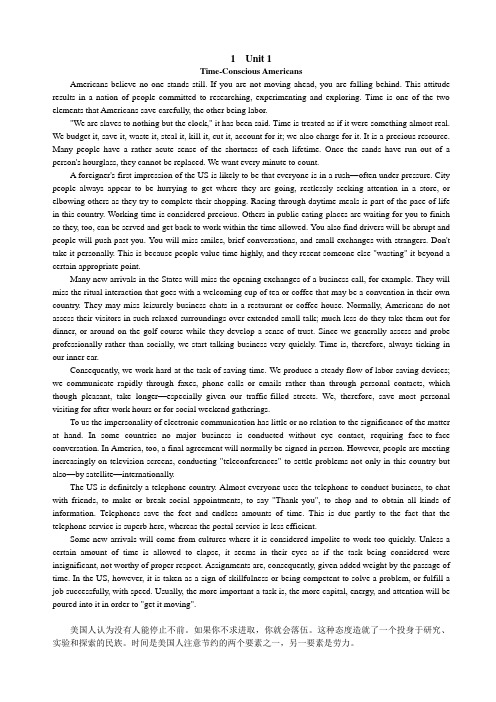
1 Unit 1Time-Conscious AmericansAmericans believe no one stands still. If you are not moving ahead, you are falling behind. This attitude results in a nation of people committed to researching, experimenting and exploring. Time is one of the two elements that Americans save carefully, the other being labor."We are slaves to nothing but the clock," it has been said. Time is treated as if it were something almost real. We budget it, save it, waste it, steal it, kill it, cut it, account for it; we also charge for it. It is a precious resource. Many people have a rather acute sense of the shortness of each lifetime. Once the sands have run out of a person's hourglass, they cannot be replaced. We want every minute to count.A foreigner's first impression of the US is likely to be that everyone is in a rush—often under pressure. City people always appear to be hurrying to get where they are going, restlessly seeking attention in a store, or elbowing others as they try to complete their shopping. Racing through daytime meals is part of the pace of life in this country. Working time is considered precious. Others in public eating-places are waiting for you to finish so they, too, can be served and get back to work within the time allowed. You also find drivers will be abrupt and people will push past you. You will miss smiles, brief conversations, and small exchanges with strangers. Don't take it personally. This is because people value time highly, and they resent someone else "wasting" it beyond a certain appropriate point.Many new arrivals in the States will miss the opening exchanges of a business call, for example. They will miss the ritual interaction that goes with a welcoming cup of tea or coffee that may be a convention in their own country. They may miss leisurely business chats in a restaurant or coffee house. Normally, Americans do not assess their visitors in such relaxed surroundings over extended small talk; much less do they take them out for dinner, or around on the golf course while they develop a sense of trust. Since we generally assess and probe professionally rather than socially, we start talking business very quickly. Time is, therefore, always ticking in our inner ear.Consequently, we work hard at the task of saving time. We produce a steady flow of labor-saving devices; we communicate rapidly through faxes, phone calls or emails rather than through personal contacts, which though pleasant, take longer—especially given our traffic-filled streets. We, therefore, save most personal visiting for after-work hours or for social weekend gatherings.To us the impersonality of electronic communication has little or no relation to the significance of the matter at hand. In some countries no major business is conducted without eye contact, requiring face-to-face conversation. In America, too, a final agreement will normally be signed in person. However, people are meeting increasingly on television screens, conducting "teleconferences" to settle problems not only in this country but also—by satellite—internationally.The US is definitely a telephone country. Almost everyone uses the telephone to conduct business, to chat with friends, to make or break social appointments, to say "Thank you", to shop and to obtain all kinds of information. Telephones save the feet and endless amounts of time. This is due partly to the fact that the telephone service is superb here, whereas the postal service is less efficient.Some new arrivals will come from cultures where it is considered impolite to work too quickly. Unless a certain amount of time is allowed to elapse, it seems in their eyes as if the task being considered were insignificant, not worthy of proper respect. Assignments are, consequently, given added weight by the passage of time. In the US, however, it is taken as a sign of skillfulness or being competent to solve a problem, or fulfill a job successfully, with speed. Usually, the more important a task is, the more capital, energy, and attention will be poured into it in order to "get it moving".美国人认为没有人能停止不前。
新视野大学英语第二版第二册课文翻译1-10单元全-图文
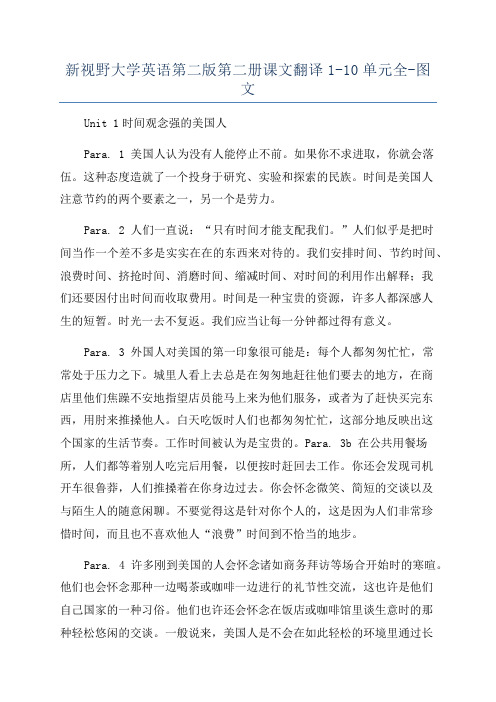
新视野大学英语第二版第二册课文翻译1-10单元全-图文Unit 1时间观念强的美国人Para. 1 美国人认为没有人能停止不前。
如果你不求进取,你就会落伍。
这种态度造就了一个投身于研究、实验和探索的民族。
时间是美国人注意节约的两个要素之一,另一个是劳力。
Para. 2 人们一直说:“只有时间才能支配我们。
”人们似乎是把时间当作一个差不多是实实在在的东西来对待的。
我们安排时间、节约时间、浪费时间、挤抢时间、消磨时间、缩减时间、对时间的利用作出解释;我们还要因付出时间而收取费用。
时间是一种宝贵的资源,许多人都深感人生的短暂。
时光一去不复返。
我们应当让每一分钟都过得有意义。
Para. 3 外国人对美国的第一印象很可能是:每个人都匆匆忙忙,常常处于压力之下。
城里人看上去总是在匆匆地赶往他们要去的地方,在商店里他们焦躁不安地指望店员能马上来为他们服务,或者为了赶快买完东西,用肘来推搡他人。
白天吃饭时人们也都匆匆忙忙,这部分地反映出这个国家的生活节奏。
工作时间被认为是宝贵的。
Para. 3b 在公共用餐场所,人们都等着别人吃完后用餐,以便按时赶回去工作。
你还会发现司机开车很鲁莽,人们推搡着在你身边过去。
你会怀念微笑、简短的交谈以及与陌生人的随意闲聊。
不要觉得这是针对你个人的,这是因为人们非常珍惜时间,而且也不喜欢他人“浪费”时间到不恰当的地步。
Para. 4 许多刚到美国的人会怀念诸如商务拜访等场合开始时的寒暄。
他们也会怀念那种一边喝茶或咖啡一边进行的礼节性交流,这也许是他们自己国家的一种习俗。
他们也许还会怀念在饭店或咖啡馆里谈生意时的那种轻松悠闲的交谈。
一般说来,美国人是不会在如此轻松的环境里通过长时间的闲聊来评价他们的客人的,更不用说会在增进相互间信任的过程中带他们出去吃饭,或带他们去打高尔夫球。
既然我们通常是通过工作而不是社交来评估和了解他人,我们就开门见山地谈正事。
因此,时间老是在我们心中的耳朵里滴滴答答地响着。
新视野大学英语第二册(第三版)Unit 2 课文及翻译
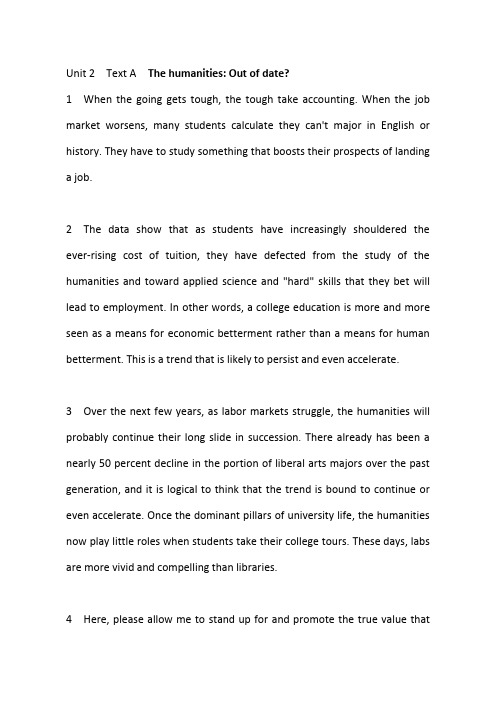
Unit 2 Text A The humanities: Out of date?1 When the going gets tough, the tough take accounting. When the job market worsens, many students calculate they can't major in English or history. They have to study something that boosts their prospects of landing a job.2 The data show that as students have increasingly shouldered the ever-rising cost of tuition, they have defected from the study of the humanities and toward applied science and "hard" skills that they bet will lead to employment. In other words, a college education is more and more seen as a means for economic betterment rather than a means for human betterment. This is a trend that is likely to persist and even accelerate.3 Over the next few years, as labor markets struggle, the humanities will probably continue their long slide in succession. There already has been a nearly 50 percent decline in the portion of liberal arts majors over the past generation, and it is logical to think that the trend is bound to continue or even accelerate. Once the dominant pillars of university life, the humanities now play little roles when students take their college tours. These days, labs are more vivid and compelling than libraries.4 Here, please allow me to stand up for and promote the true value thatthe humanities add to people's lives. Since ancient times, people have speculated about the mystery of those inner forces that drive some people to greatness and others to self-destruction. This inner drive has been called many things over the centuries. The famous psychologist, Sigmund Freud, called it the "unconscious mind" or, more familiarly, "instinct".5 From the beginning of time, this inner aspect of our being, this drive that can be constructive or destructive, has captured our imagination. The stories of this amazing struggle have formed the basis of cultures the world over. Historians, architects, authors, philosophers and artists have captured the words, images and meanings of this inner struggle in the form of story, music, myth, painting, architecture, sculpture, landscape and traditions. These men and women developed artistic "languages" that help us understand these aspirations and also educate generations. This fertile body of work from ancient times, the very foundation of civilization, forms the basis of study of the humanities.6 Studying the humanities improves our ability to read and write. No matter what we do in life, we will have a huge advantage if we can read complex ideas and understand their meaning. We will have a bright career if we are the person in the office who can write a clear and elegant analysis of those ideas!7 Studying the humanities makes us familiar with the language of emotion and the creative process. In an information economy, many people have the ability to produce a useful product such as a new MP3 player. Yet, very few people have the ability to create a spectacular brand: the iPod. Most importantly, studying the humanities invests us with great insight and self-awareness, thereby releasing our creative energy and talent in a positive and constructive manner.8 Perhaps the best argument in favor of the humanities is the scope of possibilities that are widely open to us. Did you know that James Cameron, world-famous director of the movie, Titanic, graduated with a degree in the humanities ? So did Sally Ride, the first woman in space. So did actors Bruce Lee, Gwyneth Paltrow, Renee Zellweger and Matt Damon. Dr. Harold Varmus, who won a Nobel Prize for Medicine, studied the humanities. Even Michael Eisner, Chairman of the Disney Company, majored in the humanities. Famous people who studied the humanities make a long list indeed. It's easy to see that the humanities can prepare us for many different careers and jobs we can undertake, whether medicine, business, science or entertainment. If we study only mathematics, it's likely we will be a candidate only for jobs as a mathematician. If we include studying the humanities, we can make breakthroughs on many barriers and are limitedonly by our effort and imagination.9 Of course, nowadays, if we study the humanities alone, we are liable to miss many opportunities. Each one of us needs to become as technically and professionally skilled as possible to helpmeet the needs of modern life. In fact, increasingly a pairing of technical knowledge and inner insight is seen as the ideal in the establishment of a career. If I were the Dean of Admissions at a medical school and two people applied to our school, both having the required basic scientific courses, one a philosophy major and the other solely a pre-med student, the philosophy applicant would be chosen.10 In summary, the humanities help to create well-rounded human beings with insight and understanding of the passions, hopes and dreams common to all humanity. The humanities, the ancient timeless reservoir of knowledge, teach us to see things differently and broaden our horizons. They are as useful and relevant in our modern age as they have always been. Doesn't it make sense to spend some time in the company of the humanities, our outstanding an d remarkable treasure of knowledge? Who knows how famous YOU might be come!人文学科:过时了吗?1 当形势变得困难时,强者会去选学会计。
新视野大学英语第三版第二册unit2课文重点句子解析+词汇解析
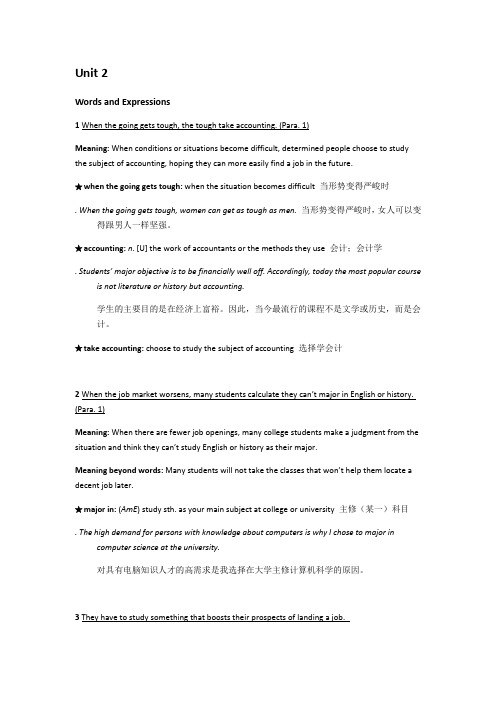
Unit 2Words and Expressions1 When the going gets tough, the tough take accounting. (Para. 1)Meaning: When conditions or situations become difficult, determined people choose to study the subject of accounting, hoping they can more easily find a job in the future.★when the going gets tough: when the situation becomes difficult 当形势变得严峻时. When the going gets tough, women can get as tough as men. 当形势变得严峻时,女人可以变得跟男人一样坚强。
★accounting: n. [U] the work of accountants or the methods they use 会计;会计学. Students’ major objective is to be financially well off. Accordingly, today the most popular course is not literature or history but accounting.学生的主要目的是在经济上富裕。
因此,当今最流行的课程不是文学或历史,而是会计。
★take accounting: choose to study the subject of accounting 选择学会计2 When the j ob market worsens, many students calculate they can’t major in English or history. (Para. 1)Meaning: When there are fewer job openings, many college students make a judgment from the situation and think they can’t study English or history as their major.Meaning beyond words: Many students will not take the classes that won’t help them locate a decent job later.★major in: (AmE) study sth. as your main subject at college or university 主修(某一)科目. The high demand for persons with knowledge about computers is why I chose to major in computer science at the university.对具有电脑知识人才的高需求是我选择在大学主修计算机科学的原因。
新视野大学英语2Unit2课文概括

What makes them heroes ?
For slaves Painful experiences Selfless contribution “Where there is oppression , there is resistance.” For whites Religious convictions The Bible, in bidding us to feed the hungry and clothe the naked, said nothing about color. Selfless contribution
What makes them heroes ?
Circumstances(形势) A hero is nothing but a product of his time.
The times produce their heroes
Thank you
The difficulties he met
There was a $1000 reward for his capture, dead oame Career Place What he did What he said Levi Coffin Shopkeeper North Carolina Newport, Indiana He opened a store in which fleeing slaves could always find refuge. The Bible, in bidding us to feed the hungry and clothe the naked, said nothing about color.
UNIT 2 THE FREEDOM GIVERS
新视野大学英语第二册第二单元课文详解
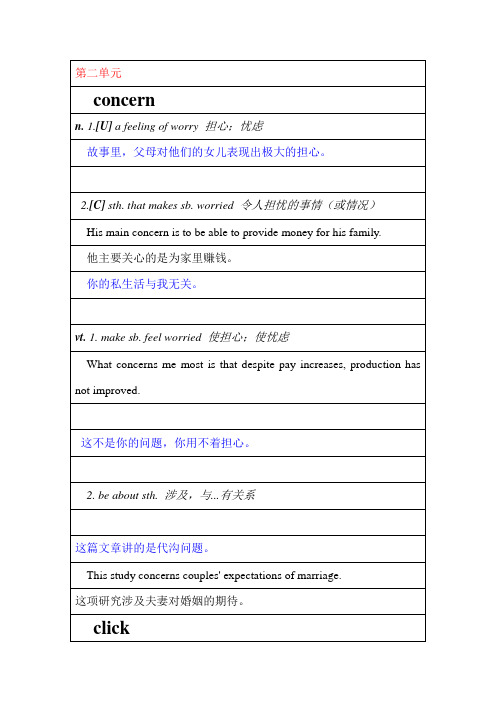
concern
n.1.[U]a feeling of worry担心;忧虑
故事里,父母对他们的女儿表现出极大的担心。
2.[C]sth. that makes sb. worried令人担忧的事情(或情况)
His main concern is to be able to providemoney for his family.
forth
ad.out; forward出来;向外
The sun came forth from behind the clouds.
太阳从云后出来。
The house was still burning with thick black smoke pouring forth.
along with
同族:horror n.惊骇,恐怖horribly ad.可怕地;非常地
stuff
n.[U]sth. that one does not know the correct name东西
What's the green stuff at the bottom of the bottle?
瓶底上那绿色的是什么东西?
Her shoes clicked against the floor as she walked.
n. [C]a short, sharp sound咔嗒声
门咔嗒一声开了。
Iheard a click, and then the phone went dead.
同类:clink (v.)发出叮当声;tick (v.)滴答地响
爆炸彻底摧毁了这栋建筑。
爆炸炸死了168人,炸伤了数百人。
考点:1:(at) full blast全力以赴地2:blast forth(声音)突然响起
新视野大学英语第二册Unit2课文翻译
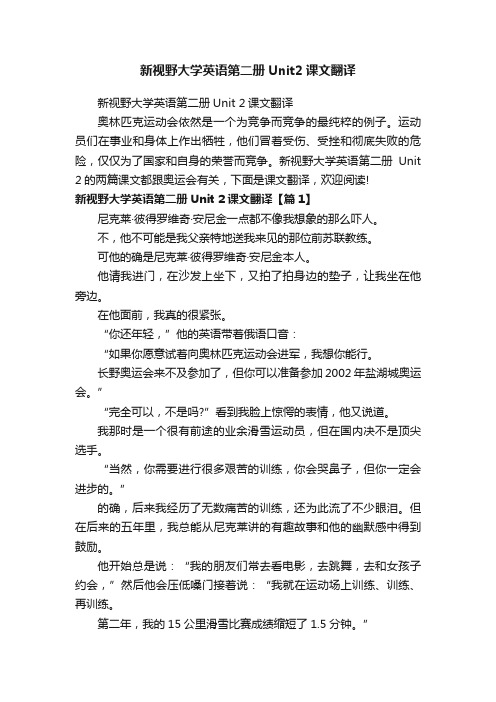
新视野大学英语第二册Unit2课文翻译新视野大学英语第二册Unit 2课文翻译奥林匹克运动会依然是一个为竞争而竞争的最纯粹的例子。
运动员们在事业和身体上作出牺牲,他们冒着受伤、受挫和彻底失败的危险,仅仅为了国家和自身的荣誉而竞争。
新视野大学英语第二册Unit 2的两篇课文都跟奥运会有关,下面是课文翻译,欢迎阅读!新视野大学英语第二册Unit 2课文翻译【篇1】尼克莱·彼得罗维奇·安尼金一点都不像我想象的那么吓人。
不,他不可能是我父亲特地送我来见的那位前苏联教练。
可他的确是尼克莱·彼得罗维奇·安尼金本人。
他请我进门,在沙发上坐下,又拍了拍身边的垫子,让我坐在他旁边。
在他面前,我真的很紧张。
“你还年轻,”他的英语带着俄语口音:“如果你愿意试着向奥林匹克运动会进军,我想你能行。
长野奥运会来不及参加了,但你可以准备参加2002年盐湖城奥运会。
”“完全可以,不是吗?”看到我脸上惊愕的表情,他又说道。
我那时是一个很有前途的业余滑雪运动员,但在国内决不是顶尖选手。
“当然,你需要进行很多艰苦的训练,你会哭鼻子,但你一定会进步的。
”的确,后来我经历了无数痛苦的训练,还为此流了不少眼泪。
但在后来的五年里,我总能从尼克莱讲的有趣故事和他的幽默感中得到鼓励。
他开始总是说:“我的朋友们常去看电影,去跳舞,去和女孩子约会,”然后他会压低嗓门接着说:“我就在运动场上训练、训练、再训练。
第二年,我的15公里滑雪比赛成绩缩短了1.5分钟。
”“朋友们问我:‘尼克莱,你怎么做到的呢?’我回答:‘你们去看电影、跳舞、和女孩子约会,而我一直在训练、训练、再训练。
’”故事通常到这儿就结束了。
但有一次──后来我们知道那天是他结婚25周年纪念日──他穿着一件旧的毛衣,很自豪地站着,微笑着轻声说道:“告诉你们,我可是在26岁那年才第一次亲吻女孩子。
她后来就和我结了婚。
”不管他是不是懂得浪漫,尼克莱知道什么是爱。
新视野大学英语读写教程(第三版)第二册第二单元原文及翻译
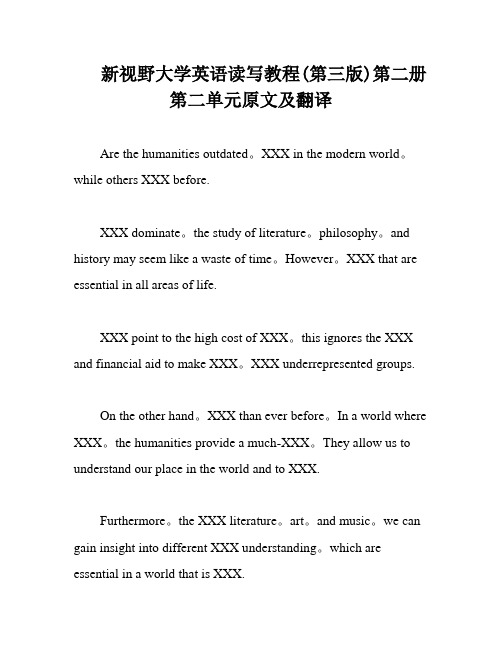
新视野大学英语读写教程(第三版)第二册第二单元原文及翻译Are the humanities outdated。
XXX in the modern world。
while others XXX before.XXX dominate。
the study of literature。
philosophy。
and history may seem like a waste of time。
However。
XXX that are essential in all areas of life.XXX point to the high cost of XXX。
this ignores the XXX and financial aid to make XXX。
XXX underrepresented groups.On the other hand。
XXX than ever before。
In a world where XXX。
the humanities provide a much-XXX。
They allow us to understand our place in the world and to XXX.Furthermore。
the XXX literature。
art。
and music。
we can gain insight into different XXX understanding。
which are essential in a world that is XXX.In n。
the XXX。
While they may face challenges。
they remain an essential part of XXX skills。
promote inclusivity。
XXX-changing world。
the XXX and the world around us.When faced with difficult ns。
新视野大学英语读写教程(第二版)第二册课文及翻译

Unit 1Time-Conscious AmericansAmericans believe no one stands still. If you are not moving ahead, you are falling behind. This attitude results in a nation of people committed to researching, experimenting and exploring. Time is one of the two elements that Americans save carefully, the other being labor."We are slaves to nothing but the clock," it has been said. Time is treated as if it were something almost real. We budget it, save it, waste it, steal it, kill it, cut it, account for it; we also charge for it. It is a precious resource. Many people have a rather acute sense of the shortness of each lifetime. Once the sands have run out of a person's hourglass, they cannot be replaced. We want every minute to count.A foreigner's first impression of the US is likely to be that everyone is in a rush—often under pressure. City people always appear to be hurrying to get where they are going, restlessly seeking attention in a store, or elbowing others as they try to complete their shopping. Racing through daytime meals is part of the pace of life in this country. Working time is considered precious. Others in public eating-places are waiting for you to finish so they, too, can be served and get back to work within the time allowed. You also find drivers will be abrupt and people will push past you. You will miss smiles, brief conversations, and small exchanges with strangers. Don't take it personally. This is because people value time highly, and they resent someone else "wasting" it beyond a certain appropriate point.Many new arrivals in the States will miss the opening exchanges of a business call, for example. They will miss the ritual interaction that goes with a welcoming cup of tea or coffee that may be a convention in their own country. They may miss leisurely business chats in a restaurant or coffee house. Normally, Americans do not assess their visitors in such relaxed surroundings over extended small talk; much less do they take them out for dinner, or around on the golf rather than socially, we start talking business very quickly. Time is, therefore, always ticking in our inner ear.Consequently, we work hard at the task of saving time. We produce a steady flow of labor-saving devices; we communicate rapidly through faxes, phone calls or emails rather than through personal contacts, which though pleasant, take longer—especially given our traffic-filled streets. We, therefore, save most personal visiting for after-work hours or for social weekend gatherings.To us the impersonality of electronic communication has little or no relation to the significance of the matter at hand. In some countries no major business is conducted without eye contact, requiring face-to-face conversation. In America, too, a final agreement will normally be signed in person. However, people are meeting increasingly on television screens, conducting "teleconferences" to settle problems not only in this country but also—by satellite—internationally.The US is definitely a telephone country. Almost everyone uses the telephone to conduct business, to chat with friends, to make or break social appointments, to say "Thank you", to shop and to obtain all kinds of information. Telephones save the feet and endless amounts of time. This is due partly to the fact that the telephone service is superb here, whereas the postal service is less efficient.Some new arrivals will come from cultures where it is considered impolite to work tooquickly. Unless a certain amount of time is allowed to elapse, it seems in their eyes as if the task being considered were insignificant, not worthy of proper respect. Assignments are, consequently, given added weight by the passage of time. In the US, however, it is taken as a sign of skillfulness or being competent to solve a problem, or fulfill a job successfully, with speed. Usually, the more important a task is, the more capital, energy, and attention will be poured into it in order to "get it moving".Unit 3Marriage Across NationsGail and I imagined a quiet wedding. During our two years together we had experienced the usual ups and downs of a couple learning to know, understand, and respect each other. But through it all we had honestly confronted the weaknesses and strengths of each other's characters.Our racial and cultural differences enhanced our relationship and taught us a great deal about tolerance, compromise, and being open with each other. Gail sometimes wondered why I and other blacks were so involved with the racial issue, and I was surprised that she seemed to forget the subtler forms of racial hatred in American society.Gail and I had no illusions about what the future held for us as a married, mixed couple in America. The continual source of our strength was our mutual trust and respect.We wanted to avoid the mistake made by many couples of marrying for the wrong reasons, and only finding out ten, twenty, or thirty years later that they were incompatible, that they hardly took the time to know each other, that they overlooked serious personality conflicts in the expectation that marriage was an automatic way to make everything work out right. That point was emphasized by the fact that Gail's parents, after thirty-five years of marriage, were going through a bitter and painful divorce, which had destroyed Gail and for a time had a negative effect on our budding relationship.When Gail spread the news of our wedding plans to her family she met with some resistance. Her mother, Deborah, all along had been supportive of our relationship, and even joked about when we were going to get married so she could have grandchildren. Instead of congratulations upon hearing our news, Deborah counseled Gail to be really sure she was doing the right thing."So it was all right for me to date him, but it's wrong for me to marry him. Is his color the problem, Mom?" Gail subsequently told me she had asked her mother."To start with I must admit that at first I harbored reservations about a mixed marriage, prejudices you might even call them. But when I met Mark I found him a charming and intelligent young guy. Any mother would be proud to have him for a son-in-law. So, color has nothing to do with it. Yes, my friends talk. Some even express shock at what you are doing. But they live in a different world. So you see, Mark's color is not the problem. My biggest worry is that you may be marrying Mark for the same wrong reasons that I married your father. When we met I saw him as my beloved, intelligent, charming, and caring. It was all so new, all so exciting, and we both thought, on the surface at least, that ours was an ideal marriage with every indication that it would last forever. I realized only later that I didn't know my beloved, your father, very well when we married.""But Mark and I have been together more than two years," Gail railed. "We've been throughso much together. We've seen each other at our worst many times. I'm sure that time will only confirm what we feel deeply about each other.""You may be right. But I still think that waiting won't hurt. You're only twenty-five."Gail's father, David, whom I had not yet met personally, approached our decision with a father-knows-best attitude. He basically asked the same questions as Gail's mother:"Why the haste? Who is this Mark? What's his citizenship status?" And when he learned of my problems with the citizenship department, he immediately suspected that I was marrying his daughter in order to remain in the United States."But Dad,that's harsh," Gail said."Then why the rush?" he asked repeatedly."Mark has had problems with citizenship before and has always taken care of them himself," Gail defended. "In fact, he made it very clear when we were discussing marriage that if I had any doubts about anything, I should not hesitate to cancel our plans."Her father proceeded to quote statistics showing that mixed couples had higher divorce rates than couples of the same race and gave examples of mixed couples he had counseled who were having marital difficulties."Have you thought about the hardships your children could go through?" he asked."Dad, are you a racist?""No, of course not. But you have to be realistic.""Maybe our children will have some problems, but whose children don't? But one thing they'll always have: our love and devotion.""That's idealistic. People can be very cruel toward children from mixed marriages.""Dad, we'll worry about that when the time comes. If we had to resolve all doubt before we acted, very little would ever get done.""Remember, it's never too late to change your mind."Unit 5Weeping for My Smoking DaughterMy daughter smokes. While she is doing her homework, her feet on the bench in front of her and her calculator clicking out answers to her geometry problems, I am looking at the half-empty package of Camels tossed carelessly close at hand. I pick them up, take them into the kitchen, where the light is better, and study them—they're filtered, for which I am grateful. My heart feels terrible. I want to weep. In fact, I do weep a little, standing there by the stove holding one of the instruments, so white, so precisely rolled, that could cause my daughter's death. When she smoked Marlboros and Players I hardened myself against feeling so bad; nobody I knew ever smoked these brands.She doesn't know this, but it was Camels that my father, her grandfather, smoked. But before he smoked cigarettes made by manufacturers—when he was very young and very poor, with glowing eyes—he smoked Prince Albert tobacco in cigarettes he rolled himself. I remember the bright-red tobacco tin, with a picture of Queen Victoria's partner, Prince Albert, dressed in a black dress coat and carrying a cane.By the late forties and early fifties no one rolled his own anymore (and few women smoked) in my hometown of Eatonton, Georgia. The tobacco industry, coupled with Hollywood movies inwhich both male and female heroes smoked like chimneys, completely won over people like my father, who were hopelessly hooked by cigarettes. He never looked as fashionable as Prince Albert, though; he continued to look like a poor, overweight, hard-working colored man with too large a family, black, with a very white cigarette stuck in his mouth.I do not remember when he started to cough. Perhaps it was unnoticeable at first, a little coughing in the morning as he lit his first cigarette upon getting out of bed. By the time I was sixteen, my daughter's age, his breath was a wheeze, embarrassing to hear; he could not climb stairs without resting every third or fourth step. It was not unusual for him to cough for an hour.My father died from "the poor man's friend", pneumonia, one hard winter when his lung illnesses had left him low. I doubt he had much lung left at all, after coughing for so many years. He had so little breath that, during his last years, he was always leaning on something. I remembered once, at a family reunion, when my daughter was two, that my father picked her up for a minute—long enough for me to photograph them—but the effort was obvious. Near the very end of his life, and largely because he had no more lungs, he quit smoking. He gained a couple of pounds, but by then he was so slim that no one noticed.When I travel to Third World countries I see many people like my father and daughter. There are large advertisement signs directed at them both: the tough, confident or fashionable older man, the beautiful, "worldly" young woman, both dragging away. In these poor countries, as in American inner cities and on reservations, money that should be spent for food goes instead to the tobacco companies; over time, people starve themselves of both food and air, effectively weakening and hooking their children, eventually killing themselves. I read in the newspaper and in my gardening magazine that the ends of cigarettes are so poisonous that if a baby swallows one, it is likely to die, and that the boiled water from a bunch of them makes an effective insecticide.There is a deep hurt that I feel as a mother. Some days it is a feeling of uselessness. I remember how carefully I ate when I was pregnant, how patiently I taught my daughter how to cross a street safely. For what, I sometimes wonder; so that she can struggle to breathe through most of her life feeling half her strength, and then die of self-poisoning, as her grandfather did?There is a quotation from a battered women's shelter that I especially like: "Peace on earth begins at home." I believe everything does. I think of a quotation for people trying to stop smoking: "Every home is a no-smoking zone." Smoking is a form of self-battering that also batters those who must sit by, occasionally joke or complain, and helplessly watch. I realize now that as a child I sat by, through the years, and literally watched my father kill himself: Surely one such victory in my family, for the prosperous leaders who own the tobacco companies, is enough.Unit 6As His Name Is, So Is He!For her first twenty-four years, she'd been known as Debbie—a name that didn't suit her good looks and elegant manner. "My name has always made me think I should be a cook," she complained. "I just don't feel like a Debbie."One day, while filling out an application form for a publishing job, the young woman impulsively substituted her middle name, Lynne, for her first name Debbie. "That was the smartest thing I ever did," she says now. "As soon as I stopped calling myself Debbie, I felt more comfortable with myself... and other people started to take me more seriously." Two years afterher successful job interview, the former waitress is now a successful magazine editor. Friends and associates call her Lynne.Naturally, the name change didn't cause Debbie/Lynne's professional achievement—but it surely helped if only by adding a bit of self-confidence to her talents. Social scientists say that what you're called can affect your life. Throughout history, names have not merely identified people but also described them. "As his name is, so is he." says the Bible, and Webster's Dictionary includes the following definition of name: "a word or words expressing some quality considered characteristic or descriptive of a person or a thing, often expressing approval or disapproval". Note well "approval or disapproval". For better or worse, qualities such as friendliness or reserve, plainness or charm may be suggested by your name and conveyed to other people before they even meet you.Names become attached to specific images, as anyone who's been called "a plain Jane" or "just an average Joe" can show. The latter name particularly bothers me since my name is Joe, which some think makes me more qualified to be a baseball player than, say, an art critic. Yet, despite this disadvantage, I did manage to become an art critic for a time. Even so, one prominent magazine consistently refused to print "Joe" in my by-line, using my first initials, J. S., instead. I suspect that if I were a more refined Arthur or Adrian, the name would have appeared complete.Of course, names with a positive sense can work for you and even encourage new acquaintances. A recent survey showed that American men thought Susan to be the most attractive female name, while women believed Richard and David were the most attractive for men. One woman I know turned down a blind date with a man named Harry because "he sounded dull". Several evenings later, she came up to me at a party, pressing for an introduction to a very impressive man; they'd been exchanging glances all evening. "Oh," I said. "You mean Harry." She was ill at ease.Though most of us would like to think ourselves free from such prejudiced notions, we're all guilty of name stereotyping to some extent. Confess: Wouldn't you be surprised to meet a carpenter named Nigel? A physicist named Bertha? A Pope Mel? Often, we project name-based stereotypes on people, as one woman friend discovered while taking charge of a nursery school's group of four-year-olds. "There I was, trying to get a little active boy named Julian to sit quietly and read a book—and pushing a thoughtful creature named Rory to play ball. I had their personalities confused because of their names!"Apparently, such prejudices can affect classroom achievement as well. In a study conducted by Herbert Harari of San Diego State University, and John McDavid of Georgia State University, teachers gave consistently lower grades on essays apparently written by boys named Elmer and Hubert than they awarded to the same papers when the writers' names were given as Michael and David. However, teacher prejudice isn't the only source of classroom difference. Dr. Thomas V. Busse and Louisa Seraydarian of Temple University found those girls with names such as Linda, Diane, Barbara, Carol, and Cindy performed better on objectively graded IQ and achievement tests than did girls with less appealing names. (A companion study showed girls' popularity with their peers was also related to the popularity of their names―although the connection was less clear for boys.)Though your parents probably meant your name to last a lifetime, remember that when they picked it they'd hardly met you, and the hopes and dreams they valued when they chose it may not match yours. If your name no longer seems to fit you, don't despair; you aren't stuck with the label. Movie stars regularly change their names, and with some determination, you can, too.Unit 7Lighten Your Load and Save Your LifeIf you often feel angry and overwhelmed, like the stress in your life is spinning out of control, then you may be hurting your heart.If you don't want to break your own heart, you need to learn to take charge of your life where you can—and recognize there are many things beyond your control.So says Dr. Robert S. Eliot, author of a new book titled From Stress to Strength: How to Lighten Your Load and Save Your Life. He's a clinical professor of medicine at the University of Nebraska.Eliot says there are people in this world that he calls "hot reactors". For these people, being tense may cause tremendous and rapid increases in their blood pressure.Eliot says researchers have found that stressed people have higher cholesterol levels, among other things. "We've done years of work in showing that excess alarm or stress chemicals can literally burst heart muscle fibers. When that happens it happens very quickly, within five minutes. It creates many short circuits, and that causes crazy heart rhythms. The heart beats like a bag of worms instead of a pump. And when that happens, we can't live."Eliot, 64, suffered a heart attack at age 44. He attributes some of the cause to stress. For years he was a "hot reactor". On the exterior, he was cool, calm and collected, but on the interior, stress was killing him. He's now doing very well.The main predictors of destructive levels of stress are the FUD factors—fear, uncertainty and doubt—together with perceived lack of control, he says.For many people, the root of their stress is anger, and the trick is to find out where the anger is coming from. "Does the anger come from a feeling that everything must be perfect?" Eliot asks."That's very common in professional women. They feel they have to be all things to all people and do it all perfectly. They think, 'I should, I must, I have to.' Good enough is never good enough. Perfectionists cannot delegate. They get angry that they have to carry it all, and they blow their tops. Then they feel guilty and they start the whole cycle over again.""Others are angry because they have no compass in life. And they give the same emphasis to a traffic jam that they give a family argument," he says. "If you are angry for more than five minutes—if you stir the anger within you and let it build with no safety outlet—you have to find out where it's coming from.""What happens is that the hotter people get, physiologically, with mental stress, the more likely they are to blow apart with some heart problem."One step to calming down is to recognize you have this tendency. Learn to be less hostile by changing some of your attitudes and negative thinking.Eliot recommends taking charge of your life. "If there is one word that should be substituted for stress, it's control. Instead of the FUD factors, what you want is the NICE factors—new, interesting, challenging experiences.""You have to decide what parts of your life you can control," he says. "Stop where you are on your trail and say, 'I'm going to get my compass out and find out what I need to do.' "He suggests that people write down the six things in their lives that they feel are the most important things they'd like to achieve. Ben Franklin did it at age 32. "He wrote down things like being a better father, being a better husband, being financially independent, being stimulatedintellectually and remaining even-tempered—he wasn't good at that."Eliot says you can first make a list of 12 things, then cut it down to 6 and set your priorities. "Don't give yourself impossible things, but things that will affect your identity, control and self-worth.""Put them on a note card and take it with you and look at it when you need to. Since we can't create a 26-hour day we have to decide what things we're going to do."Keep in mind that over time these priorities are going to change. "The kids grow up, the dog dies and you change your priorities."From Eliot's viewpoint, the other key to controlling stress is to "realize that there are other troublesome parts of your life over which you can have little or no control—like the economy and politicians".You have to realize that sometimes with things like traffic jams, deadlines and unpleasant bosses, "You can't fight. You can't flee. You have to learn how to flow."Unit 8There's a Lot More to Life than a JobIt has often been remarked that the saddest thing about youth is that it is wasted on the young.Reading a survey report on first-year college students, I recalled the regret, "If only I knew then what I know now."The survey revealed what I had already suspected from informal polls of students both in Macon and at the Robins Resident Center: If it (whatever it may be) won't compute and you can't drink it, smoke it or spend it, then "it" holds little value.According to the survey based on responses from over 188,000 students, today's college beginners are "more consumeristic and less idealistic" than at any time in the 17 years of the poll.Not surprising in these hard times, the students' major objective "is to be financially well off". Less important than ever is developing a meaningful philosophy of life. Accordingly, today the most popular course is not literature or history but accounting.Interest in teaching, social service and the humanities is at a low, along with ethnic and women's studies. On the other hand, enrollment in business programs, engineering and computer science is way up.That's no surprise either. A friend of mine (a sales representative for a chemical company) was making twice the salary of college instructors during her first year on the job—even before she completed her two-year associate degree."I'll tell them what they can do with their music, history, literature, etc.," she was fond of saying. And that was four years ago; I tremble to think what she's earning now.Frankly, I'm proud of the young lady (not her attitude but her success). But why can't we have it both ways? Can't we educate people for life as well as for a career? I believe we can.If we cannot, then that is a conviction against our educational system—kindergarten, elementary, secondary and higher. In a time of increasing specialization, more than ever, we need to know what is truly important in life.This is where age and maturity enter. Most people, somewhere between the ages of 30 and 50, finally arrive at the inevitable conclusion that they were meant to do more than serve acorporation, a government agency, or whatever.Most of us finally have the insight that quality of life is not entirely determined by a balance sheet. Sure, everyone wants to be financially comfortable, but we also want to feel we have a perspective on the world beyond the confines of our occupation; we want to be able to render service to our fellow men and to our God.If it is a fact that the meaning of life does not dawn until middle age, is it then not the duty of educational institutions to prepare the way for that revelation? Most people, in their youth, resent the Social Security deductions from their pay, yet a seemingly few short years later find themselves standing anxiously by the mailbox.While it's true all of us need a career, preferably a prosperous one, it is equally true that our civilization has collected an incredible amount of knowledge in fields far removed from our own. And we are better for our understanding of these other contributions—be they scientific or artistic. It is equally true that, in studying the diverse wisdom of others, we learn how to think. More importantly, perhaps, education teaches us to see the connections between things, as well as to see beyond our immediate needs.Weekly we read of unions that went on strike for higher wages, only to drive their employer out of business. No company, no job. How short-sighted in the long run.But the most important argument for a broad education is that in studying the accumulated wisdom of the ages, we improve our moral sense. I saw a cartoon recently which depicts a group of businessmen looking puzzled as they sit around a conference table; one of them is talking on the intercom: "Miss Baxter," he says, "could you please send in someone who can distinguish right from wrong?"In the long run that's what education really ought to be about. I think it can be. My college roommate, now head of a large shipping company in New York, not surprisingly was a business major. But he also hosted a classical music show on the college's FM station and listened to Wagner as he studied his accounting.That's the way it should be. Oscar Wilde had it right when he said we ought to give our ability to our work but our genius to our lives.Let's hope our educators answer students' cries for career education, but at the same time let's ensure that students are prepared for the day when they realize their short-sightedness. There's a lot more to life than a job.Unit 1美国人认为没有人能停止不前。
- 1、下载文档前请自行甄别文档内容的完整性,平台不提供额外的编辑、内容补充、找答案等附加服务。
- 2、"仅部分预览"的文档,不可在线预览部分如存在完整性等问题,可反馈申请退款(可完整预览的文档不适用该条件!)。
- 3、如文档侵犯您的权益,请联系客服反馈,我们会尽快为您处理(人工客服工作时间:9:00-18:30)。
他们不得不沿着山坡炸出一条路来。
第一枪打偏了,在墙上炸出了一个洞。
n. [C]an explosion爆炸
The blast completely destroyed the building.
Her shoes clicked against the floor as she walked.
n. [C]a short, sharp sound咔嗒声
门咔嗒一声开了。
I heard a click, and then the phone went dead.
同类:clink (v.)发出叮当声;tick (v.)滴答地响
同族:horror n.惊骇,恐怖horribly ad.可怕地;非常地
stuff
n.[U]sth. that one does not know the correct name东西
爆炸彻底摧毁了这栋建筑。
爆炸炸死了168人,炸伤了数百人。
考点:1:(at) full blast全力以赴地2:blast forth(声音)突然响起
He was working at full blast in order to complete the order before the holiday.
forth
ad.out; forward出来;向外
The sun came forth from behind the clouds.
太阳从云后出来。
The house was still burning with thick black smoke pouring forth.
along with
他主要关心的是为家里赚钱。
你的私生活与我无关。
vt.1. make sb. feel worried使担心;使忧虑
What concerns me most is that despite pay increases, production has not improved.
这不是你的问题,你用不着担心。
stop using a piece of equipment by moving a switch关闭
离开时请将所有的灯关掉,我们浪费不起电。
She turned off the water, dried herself, and dressed in jeans and a shirt.
她把水关掉,擦干身上的水,然后穿上牛仔裤和衬衫。
辨析:blast/explode爆炸
Blast指用炸弹“炸毁”房屋等物体。Eg:They’ve blasted away the rock to build a new road.
Explode指炸弹“爆炸”或人使炸弹“爆炸”,强调物体爆炸而释放大量热量的一刹那。主语可以是人也可以是炸弹等物。Eg:The firework exploded in his hand.
blast
vi.produce a lot of noise, esp. music发出响亮的声音(尤指音乐)
收音机里猛地响起了音乐。
A machine gun blasted just outside the tent.
帐篷外,机关枪突然嘟嘟嘟地响起来。
vt.break up by explosion爆破
第二单元
concern
n.1.[U]a feeling of worry担心;忧虑
故事里,父母对他们的女儿表现出极大的担心。
2.[C]sth. that makes sb. worried令人担忧的事情(或情况)
His main concern is to be able to provide money for his family.
常考:burst through:冲破,拨开
Eg:The police burst through their door.警察破门而入。
burst into
1. enter a place suddenly闯入
She burst into the manager's office and demanded to speak to him.
她冲入经理办公室,要求当面跟他说话。
他的伙伴听到这消息非常激动,冲进房间去告诉他。
2. start suddenly突然开始
She burst into laughter.
她突然笑了起来。
然后,她径直走进卫生间哭了起来。
horrible
a.1.very bad or unpleasant糟糕的;使人不愉快的
2. be about sth.涉及,与...有关系
这篇文章讲的是代沟问题。
This study concerns couples' expectations of marriage.
这项研究涉及夫妻对婚姻的期待。
click
vi.make a short, sharp sound发出咔嗒声
钥匙在琐里咔嗒响了一声。
together with一起,一道
Along with hundreds of others, she lost her job when the factory closed.
The mother was saved from the fire along with her baby.
turn off
burst
vi.(burst, burst)move somewhere suddenly or quickly, esp. into or out of a place冲,闯
She burst out of the room without saying a single word.
她什么也没说,冲出了房间。
Thiscaketastes horrible!
这蛋糕真难吃!
The weather has been really horrible all week.
这一周天气真是糟糕透了。
2.shocking; frightening可怕的;令人恐惧的
What a horrible story!
可怕的故事!
听到世界上有这么多人挨饿,没东西吃,感到很可怕。
